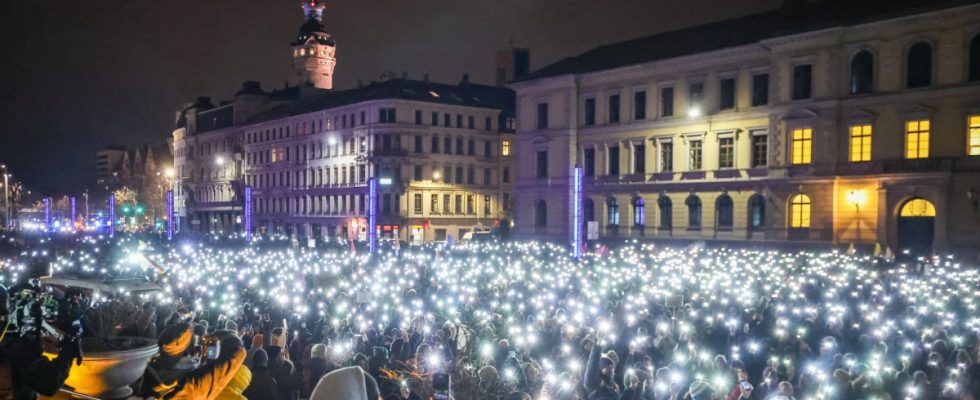Revelations about a meeting between right-wing extremists and AfD politicians in Potsdam have sparked a citizens’ movement against right-wing extremism and for democracy. On Monday evening, at least 7,000 people took to the streets in Leipzig, 6,700 in Essen and 2,500 in Rostock – and further large-scale rallies are planned. In Munich, for example, an alliance of more than 130 organizations is calling for a demonstration next Sunday.
Apparently, people can be mobilized in many places who have not previously publicly committed themselves against the right: In Essen, for example, the “Essen opposes itself” alliance had expected 500 to 600 participants on Monday – eleven times as many turned up. Several thousand people had already gathered in Berlin and Potsdam over the weekend.
It has brought many people to their feet a report from the research network Correctiv from last week. Accordingly, at the end of November, several AfD members, right-wing extremist identitarians and two members of the Values Union association, in which CDU members are also involved, discussed plans for “remigration”, a mass expulsion of immigrants and Germans with a migration background, in a Potsdam country hotel. Participants from the ranks of the AfD included Roland Hartwig, personal assistant to party and parliamentary group leader Alice Weidel, Bundestag member Gerrit Huy and Ulrich Siegmund, AfD parliamentary group leader in Saxony-Anhalt.
The AfD leadership tried to distance itself from the meeting in Potsdam and at the same time go on the attack. Party leader Weidel separated from Hartwig on Monday evening and the employment contract with him would be terminated by “mutual agreement,” said a party spokesman. Party leader Weidel did not provide a reason when asked on Tuesday.
During an appearance in the Bundestag, she said that the real scandal was that a private event had been spied on by “activists” using secret service methods. “These are GDR methods,” said Weidel. The aim here is to “criminalize private exchange of opinions”. The AfD’s positions are not determined in alleged secret meetings, but at AfD party conferences.
Hartwig initially said he knew nothing about the opening lecture
The AfD federal executive board discussed the issue on Monday evening. Federal executive circles then said that Hartwig had explained his behavior and had been criticized by the majority in the management body.
In an initial reaction to the reports from the Potsdam meeting, Hartwig stated that he had not known “in advance” that the well-known Austrian right-wing extremist Martin Sellner would appear at the meeting. However, a letter of invitation to the meeting, which the SZ was able to view, states that Sellner would open the meeting with a lecture. Hartwig admitted that he knew about Sellner’s participation shortly before the meeting, which damaged the relationship of trust between Weidel and him, sources in the AfD federal executive committee said.
The former Bundestag member Hartwig led a working group in the AfD until the end of 2020, which was intended to encourage party members to exercise moderation so as not to provide the Office for the Protection of the Constitution with a target. The handouts that he was responsible for developing say: “As we know, anti-constitutional statements and behavior have no place in the AfD.” At the end of 2020, Hartwig was removed as head of the working group by the AfD federal executive board because he spoke out against the expulsion of the extremely right-wing former Brandenburg AfD state and parliamentary group leader Andreas Kalbitz.
The parliamentary managing director of the AfD parliamentary group, Bernd Baumann, tried on Tuesday to downplay the incident in Potsdam. It’s about “individual people who went there privately,” he said, and it’s a discussion group, of which there are “thousands in the republic.” He avoided distancing himself from the right-wing extremist Sellner, one of the leading figures of the so-called Identitarian Movement. “Who should I distance myself from, who is Mr. Sellner?” asked Baumann. The reaction to the meeting in Potsdam was completely exaggerated.
In a joint statement on Tuesday, the AfD parliamentary group leaders in the eastern German states defended the mass deportation and resettlement of immigrants and those required to leave the country called for by the AfD. “Remigration is not forbidden or offensive, but in Germany’s national interest,” says the statement, which was signed by, among others, Ulrich Siegmund and the right-wing extremist Thuringian AfD leader Björn Höcke. It goes on to say: “Germany must become more German again.”
In Berlin, 120 clubs and organizations are calling for a human chain
In Munich, the alliance that is inviting people to the counter-demonstration on January 21st in front of the Siegestor has grown to 130 organizations within a short period of time. It ranges from churches to individual institutions such as the International Montessori School or the Condrobs drug counseling center to youth organizations of some parties – but leaves out the parties themselves: “We want to represent a civil society protest, apart from the usual political process,” says Luc Ouali, one of the Organizers.
In Berlin, a similarly broad alliance is inviting people to a large demonstration on February 3rd. Under the motto “We are the firewall,” the demonstrators should then form a chain around the Bundestag. Because if politicians do not succeed in stopping the right-wing extremists, “we will have to form a human firewall against the right,” says co-organizer Tareq Alaows from Pro Asyl. Since the summer, several aid organizations in Berlin have been working on a civil society alliance against the right in response to the AfD’s rising poll results. At the end of the year, the “Hand in Hand” alliance had 120 clubs and organizations.

